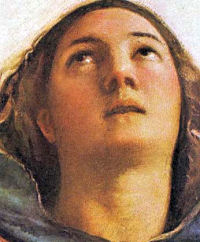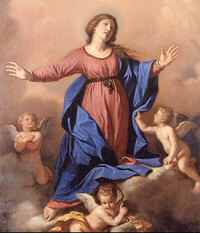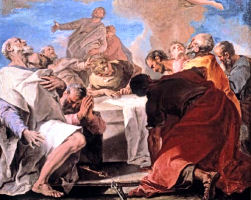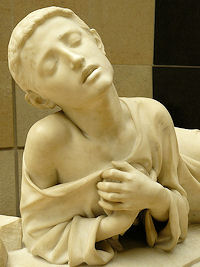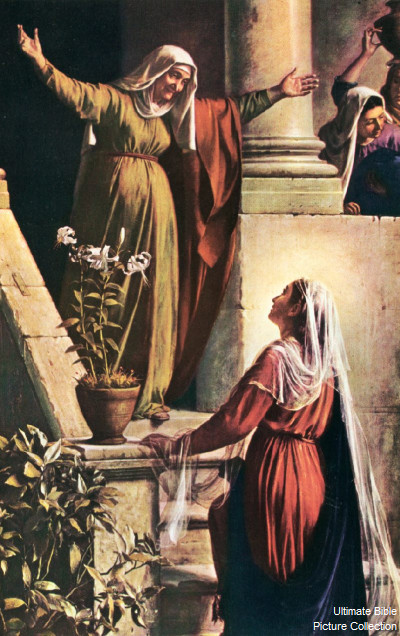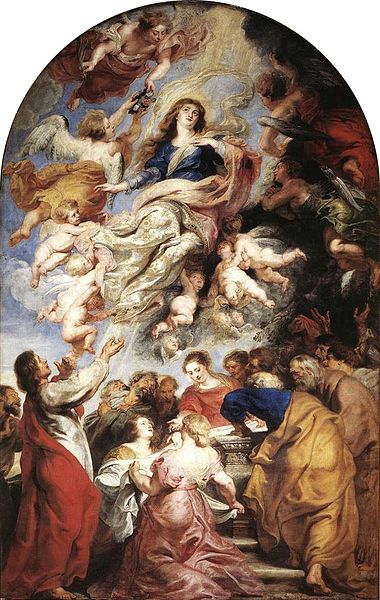To: All
Assumption of the Blessed Virgin Mary
Assumption of the Blessed Virgin Mary
Solemnity
August 15th
Mateo Cerezo
Assumption of Mary
Oil on canvas, 237 x 169 cm
Museo del Prado, Madrid
'See the beauty of the daughter of Jerusalem, who ascended to heaven like the rising sun at dawn.'
-- Benedictus antiphon from Daily Office
"By contemplating Mary in heavenly glory, we understand that the earth is not the definitive homeland for us either, and that if we live with our gaze fixed on eternal goods we will one day share in this same glory and the earth will become more beautiful. Consequently, we must not lose our serenity and peace even amid the thousands of daily difficulties. The luminous sign of Our Lady taken up into Heaven shines out even more brightly when sad shadows of suffering and violence seem to loom on the horizon.
"We may be sure of it: from on high, Mary follows our footsteps with gentle concern, dispels the gloom in moments of darkness and distress, reassures us with her motherly hand. Supported by awareness of this, let us continue confidently on our path of Christian commitment wherever Providence may lead us. Let us forge ahead in our lives under Mary's guidance".
— Pope Benedict XVI, General Audience at Castel Gandolfo Aug. 16, 2006.
For hundreds of years, Catholics observed the feast of the Assumption of the Blessed Virgin Mary on August 15 -- celebrating Mary's being taken bodily to Heaven after her death -- but it was not until 1950 that the Church proclaimed this teaching a dogma of the Church -- one of the essential beliefs of the Catholic faith.
This page includes history and observance of the Feast of the Assumption - special Prayers and Devotions including hymns and Scripture readings - Suggested Activities for families
Deiparae Virginis Mariae, Encyclical of Pope Pius XII on the Possibility of Defining the Assumption of the Blessed Virgin Mary as a Dogma of Faith, May 1, 1946 [Links to the Vatican website]
Apostolic Constitution: Munificentissimus Deus -- Defining the Dogma of the Assumption, Pope Pius XII, November 1, 1950
August 15 is the day that Catholics have long celebrated what is called the Dormition (falling asleep) or Assumption of the Virgin Mary. The Feast of the Assumption celebrates both the happy departure of Mary from this life by her natural death, and her assumption bodily into heaven.
Along with the Feast of the Immaculate Conception (December 8) the Assumption is a principal feast of the Blessed Virgin and a Holy Day of Obligation -- one of the most important feasts of the Church year. (In the United States, in 1991, the US bishops amended the Church calendar by removing the obligation to attend Mass whenever January 1, August 15, or November 1 fell on a Saturday or a Monday. Their action was approved by the Holy See in 1992.)
Now at the end of the summer season, the Church celebrates the most glorious "harvest festival" in the Communion of Saints -- Mary, the supremely blessed one among women, Mary, the most precious fruit which has ripened in the fields of God's kingdom, is today taken into heaven.
The idea of the assumption of Mary into heaven after her death is first expressed in narratives of the fifth and sixth centuries. Even though these were never official, they bear witness to the very early belief in a teaching of the Catholic Church which was not formally defined as a dogma (a teaching essential to the Catholic faith) until 50 years ago.
Though it was almost universally believed for more than a thousand years, the Bible contains no mention of the assumption of Mary into heaven. The first Church writer to speak of Mary's being taken up into heaven by God is Saint Gregory of Tours (594). Other early sermons on the Feast of Mary's entry into heaven are those of Ps.-Modestus of Jerusalem (ca. 700).
On May 1, 1946, Pope Pius XII, asked all bishops in the world whether they thought this belief in the assumption of Mary into heaven should be defined as a proposition of faith, and whether they with their clergy and people desired the definition. Almost all the bishops replied in the affirmative.
On November 1, 1950, the Feast of All Saints, Pope Pius XII declared as a dogma revealed by God that "Mary, the immaculate perpetually Virgin Mother of God, after the completion of her earthly life, was assumed body and soul into the glory of Heaven".
We have no real knowledge of the day, year, and manner of Our Lady's death. The dates which have been assigned to her death vary between three and fifteen years after Christ's Ascension. Both Jerusalem and Ephesus claim to be the place where she died. (By tradition, Mary lived at Ephesus after the death of Jesus.) Mary's tomb was presumably found in Jerusalem. It is believed that Mary died in the presence of all the Apostles, but that after her burial, her tomb, when opened, was found empty. Therefore, they concluded that her body had been taken up (assumed) into heaven.
Saint Gregory of Tour provided a rationale for the tradition, which is related to her having been preserved from original sin. He said that it is inconceivable to think Mary's sinless body, likened to the Ark of the Covenant which was made of incorruptible wood, should decay in the grave. The text, 'Rise thou and the ark of thy strength' (Ps 132/1:8) was understood to mean that it was God's will that, as Christ had ascended, so too Mary would be received into heaven.
There is an important difference, of course, between the ascension of Jesus into Heaven after His Resurrection, and the assumption of Mary. To ascend is to rise up under one's own power; while to be assumed means something that is done to one. Jesus, being the Second Person of the Trinity, had no need of assistance; whereas Mary did not have this power. (A pastor once demonstrated this difference in an unusual way. He asked two children to come to the front of the church. He told one child to walk from one side of the sanctuary to the other; and the other child he carried across.)
According to one tradition, Mary was warned of her approaching end by Saint Michael the Archangel, who conducts souls to Heaven, and was surrounded on her death-bed by the apostles, who were miraculously transported to her bedside from their various mission-fields. It was said that Jesus appeared, bore away her soul, and returned three days after her burial, when angels carried her body to Paradise where it was reunited with her soul under the Tree of Life.
Observance of the Assumption
In Catholic countries the Assumption of the Blessed Virgin Mary is one of the most popular festivals of the year.
The increased number and splendor of paintings of Mary's assumption into heaven from the late sixteenth century onwards, in which Mary appears as "a woman, adorned with the sun, standing on the moon, and with twelve stars on her head for a crown" (from the description in the Book of Revelation 12:1), attests the depth of popular devotion to this manifestation of divine grace bestowed on the Mother of God.
The theme of the heavenly coronation of the Blessed Virgin as Queen of Heaven, often represented paintings and sculpture, is related to her being assumed into Heaven where she reigns next to her Divine Son.
The title "Mother of God" (in Greek, Theotokos), was officially conferred upon Mary at the Council of Ephesus, in 431. (As an Anglican bishop once responded to Protestant objections to this title for Mary, "If she was not the mother of God, who was she the mother of?")
The Feast of the Assumption has always been loved dearly by the faithful who are children of Mary. It is a sign to us that someday, through God's grace and our efforts, we too may join the Blessed Mother in giving glory to God. The Assumption is a source of great hope for us, too, for it points the way for all followers of Christ who imitate her fidelity and obedience to God's will. Where she now is, we are meant eventually to be, and may hope to be through Divine grace. Mary's being taken to heaven after her life on earth was ended is the logical outcome of her immaculate nature, uniquely protected -- also by God's grace -- from personal sin. We seek to imitate her self-sacrificing love, her indestructible faith and her perfect obedience.
"Blessed is she who trusted that the Lord's words to her would be fulfilled."
For Christians, death is not extinction, though, unlike Mary, all ordinary mortals, even the most faithful Christians, the saints, must await the Second Coming of Christ and the general Resurrection to receive our "glorified bodies".
'May we see heaven as our goal and come to share her glory'.
Bibliography:
The Catholic Encyclopedia. New York: Robert Appleton Company, 1907.
Metford, J.C.J. The Christian Year. New York: Crossroad Pub., 1991.
Ott, Ludwig, Dr. Fundamentals of Catholic Dogma. trans. Patrick Lynch. Tan Books and Publishers Inc., 1960.
Parsch, Pius, The Church's Year of Grace. Collegeville, MN.: The Liturgical Press, 1959.
Vitz, Evelyn Birge. A Continual Feast. San Francisco: Ignatius Press, 1991.
Prayers and Devotions for the Feast of the Assumption
HYMN: The Ark which God has Sanctified
The ark which God has sanctified,
Which He has filled with grace,
Within the temple of the Lord
Has found a resting-place.
More glorious than the seraphim,
This ark of love divine,
Corruption could not blemish her
Whom death could not confine.
God-bearing Mother, Virgin chaste,
Who shines in heaven's sight;
She wears a royal crown of stars
Who is the door of Light.
To Father, Son and Spirit blest
may we give endless praise
With Mary, who is Queen of heaven,
Through everlasting days.
(from Stanbrook Abbey Hymnal)
Prayer Intercessions
- We lift up our prayers to be one with the Blessed Mother who today was assumed into heaven:
- That the blessed Virgin Mary, Mother of the Church, will guide and support all Church leaders with her maternal love.
- That all people will revere the sanctity of human life, and for an end to abortion and euthanasia.
- For blessings on children, especially those who are orphaned or abused.
- For the grace to live modestly and chastely.
- Eternal Word, you taught your mother Mary to choose the part that was best; let us follow her example and hunger for the food of everlasting life.
Loving Father, you have raised up the Blessed Virgin Mary to share in your communion of love. Accept us into that holy embrace through the sacrifice of our prayers. We ask this through Christ our Lord. Amen.
(Compiled from Daily Office books)
Meditations
"Jesus gave every human being to Mary, and commanded her to show to each one of us the heart of a mother. Mary fulfilled this, and she continues throughout eternity to fulfill with an incomparable perfection this command of God, just as she had all the others."
Venerable Charles de Foucauld
[We seek to] attain to the unity of the Son of God, to mature manhood, to the measure of the stature of the fullness of Christ; so that we may no longer be children, tossed to and fro and carried about with every wind of doctrine, by the cunning of men, by their craftiness in deceitful wiles.
Rather, speaking the truth in love, we are to grow up in every way into Him who is the head, into Christ, from whom the whole body, joined and knit together by every joint with which it is supplied, when each part is working properly, makes bodily growth and up builds itself in love.
- Ephesians 4: 13-16
(Revised Standard Version - Catholic Edition)
"The more we are sinners, the more she has tenderness and compassion for us."
- Saint John Marie Vianney, the Curé of Ars
Hymn: Immaculate Mary
Immaculate Mary, thy praises we sing,
Who reignest in splendor with Jesus, Our King.
Ave, ave, ave Maria! Ave, ave Maria!
In heaven the blessed thy glory proclaim;
On earth, we, thy children, invoke thy sweet name!
Ave, ave, ave Maria! Ave, ave Maria!
We pray for our mother, the Church upon earth;
And bless, dearest Lady, the land of our birth.
Ave, ave, ave Maria! Ave, ave Maria!
(The Adoremus Hymnal - p 532)
Scripture readings for the Feast of the Assumption of the Blessed Virgin Mary
Vigil Readings:
Collect:
O God, who, looking on the lowliness of the Blessed Virgin Mary,
raised her to this grace,
that your Only Begotten Son was born of her according to the flesh
and that she was crowned this day with surpassing glory,
grant through her prayers,
that, saved by the mystery of your redemption,
we may merit to be exalted by you on high.
Through our Lord Jesus Christ, your Son,
who lives and reigns with you in the unity of the Holy Spirit,
one God, for ever and ever. +Amen.
First Reading: 1 Chr 15:3-4, 15,16;16:1-2
David assembled all Israel at Jerusalem, to bring up the ark of the Lord to its place, which he had prepared for it. And David gathered together the sons of Aaron and the Levites: And the Levites carried the ark of God upon their shoulders with the poles, as Moses had commanded according to the word of the Lord. David also commanded the chiefs of the Levites to appoint their brethren as the singers who should play loudly on musical instruments, on harps and lyres and cymbals, to raise sounds of joy.
And they brought the ark of God, and set it inside the tent which David had pitched for it; and they offered burnt offerings and peace offerings before God. And when David had finished offering the burnt offerings and the peace offerings, he blessed the people in the name of the Lord.
Second Reading: 1 Cor 15:54b-57
"Death is swallowed up in victory." "O death, where is thy victory? O death, where is thy sting?" The sting of death is sin, and the power of sin is the law. But thanks be to God, who gives us the victory through our Lord Jesus Christ.
Gospel Reading: Lk 11:27-28
As he said this, a woman in the crowd raised her voice and said to Him, "Blessed is the womb that bore you, and the breasts that you sucked!" But He said, "Blessed rather are those who hear the word of God and keep it!"
Readings for the Mass during the Day
Collect:
Almighty ever-living God,
who assumed the Immaculate Virgin Mary, the Mother of your Son,
body and soul into heavenly glory,
grant, we pray,
that, always attentive to the things that are above,
we may merit to be sharers of her glory.
Through our Lord Jesus Christ, your Son,
who lives and reigns with you in the unity of the Holy Spirit,
one God, for ever and ever. +Amen.
First Reading: Revelation 11:19a; 12:1-6a, 10ab
"A woman clothed with the sun, with the moon beneath her feet"
God's temple in heaven was opened, and the ark of His covenant could be seen in the temple.
A great sign appeared in the sky, a woman clothed with the sun, with the moon beneath her feet, and on her head a crown of twelve stars.
She was with child and wailed aloud in pain as she labored to give birth.
Then another sign appeared in the sky; it was a huge red dragon, with seven heads and ten horns, and on its heads were seven diadems.
Its tail swept away a third of the stars in the sky and hurled them down to the earth.
Then the dragon stood before the woman about to give birth, to devour her child when she gave birth.
She gave birth to a son, a male child, destined to rule all the nations with an iron rod. Her child was caught up to God and His throne. The woman herself fled into the desert where she had a place prepared by God.
Then I heard a loud voice in heaven say: "Now have salvation and power come, and the kingdom of our God and the authority of His Anointed One."
Second Reading: I Corinthians 15:20-27
"Christ the firstfruits, then those who belong to Him".
Brothers and sisters: Christ has been raised from the dead, the first fruits of those who have fallen asleep.
For since death came through man, the resurrection of the dead came also through man.
For just as in Adam all die, so too in Christ shall all be brought to life, but each one in proper order:
Christ the firstfruits; then, at His coming, those who belong to Christ; then comes the end, when He hands over the kingdom to His God and Father, when He has destroyed every sovereignty and every authority and power.
For He must reign until He has put all His enemies under His feet.
The last enemy to be destroyed is death, for "He subjected everything under His feet."
Gospel Reading: Luke 1:39-56
In those days Mary arose and went with haste into the hill country, to a city of Judah, and she entered the house of Zechariah and greeted Elizabeth. And when Elizabeth heard the greeting of Mary, the babe leaped in her womb; and Elizabeth was filled with the Holy Spirit and she exclaimed with a loud cry, "Blessed are you among women, and blessed is the fruit of your womb! And why is this granted me, that the mother of my Lord should come to me? For behold, when the voice of your greeting came to my ears, the babe in my womb leaped for joy. And blessed is she who believed that there would be a fulfilment of what was spoken to her from the Lord." And Mary said, "My soul magnifies the Lord, and my spirit rejoices in God my Savior, for He has regarded the low estate of his handmaiden. For behold, henceforth all generations will call me blessed; for He who is mighty has done great things for me, and holy is His name. And His mercy is on those who fear Him from generation to generation. He has shown strength with His arm, He has scattered the proud in the imagination of their hearts, He has put down the mighty from their thrones, and exalted those of low degree; He has filled the hungry with good things, and the rich He has sent empty away. He has helped His servant Israel, in remembrance of His mercy, as He spoke to our fathers, to Abraham and to His posterity for ever." And Mary remained with her about three months, and returned to her home.
SUGGESTED ACTIVITIES for observing the Assumption in the "Domestic Church"
Here is picture of Mary holding the Baby Jesus and surrounded by children for your children to color. The artist, Phyllis Mees, drew this for WFF's "Family Sourcebook" series. This can help you teach even very young children the words of the "Hail Mary". Don't forget to hang the results on your refrigerator!
(Click here for a full size version to download or print out for your children.)
Hail Mary, full of Grace, the Lord is with thee:
Blessed art thou amongst women, and blessed is the fruit of thy womb, Jesus.
Holy Mary, Mother of God, pray for us sinners now and at the hour of our death. Amen.
- Read the Catechism of the Catholic Church, Chapter 3, ¶6.
"Finally; the Immaculate Virgin, preserved free from all stain of original sin, when the course of her earthly life was finished, was taken up body and soul into heavenly glory, and exalted by the Lord as Queen over all things, so that she might be the more fully conformed to her Son, the Lord of lords and conqueror of sin and death." The Assumption of the Blessed Virgin is a singular participation in her Son's Resurrection and an anticipation of the resurrection of other Christians:
In giving birth you kept your virginity; in your Dormition you did not leave the world, O Mother of God, but were joined to the source of Life. You conceived the living God and, by your prayers, will deliver our souls from death.... She is our Mother in the order of grace."
This passage from the Catechism might be read aloud, by a parent or one of the older children, during family prayers; for example before saying at least one decade of the Rosary together.
- The day before the feast, gather or buy flowers to place before a picture or statue of the Blessed Virgin Mary in your home, and tell (or read) the meaning of the feast to your child or children at bedtime on August 14th. (See Mary's Flowers)
- Take flowers to Mass on the Feast of the Assumption, and, after Mass, place them near the altar, shrine or statue Blessed Virgin Mary in your church. (Children enjoy doing making the "flower offering", so it would be a good idea to have enough flowers for each child to place one.)
- If your church has a Mary shrine, have each child light a candle, kneel and say a prayer or a "Hail Mary". Even if it does not, you can do this at your home -- the "domestic Church".
- Get a few votive candles and holders (one for each child), set a statue or picture of the Blessed Virgin on a table or shelf to make a little shrine. Place a rose or other flowers near the statue. Have each child light a votive candle. (Mother or an older child can light the baby's candle.) Kneel and say prayers together.
- After Mass talk about the celebration with your child. Discuss the meaning of the feast, and why it is important to Catholics. This would be a good opportunity to talk about motherhood, death and heaven -- and to answer questions. (Take advantage of "teaching moments"!)
- Pray the Glorious Mysteries of the Rosary with your family -- maybe just after dinner, before homework and other distractions begin. (You might also say the Rosary together, or listen to a tape, in the car).
The Glorious Mysteries are: Jesus' Resurrection from the Dead; His Ascension into Heaven; The Descent of the Holy Spirit; The Assumption of the Blessed Virgin Mary; The Coronation of the Virgin Mary in Heaven. - Talk to your children about motherhood (and even grandmotherhood): the many roles of a mother, the various tasks and duties and joys of a mother. Maybe you can give them some ideas about what you do each day. Talk about what Mary's daily life must have been like -- how being the Mother of Jesus made "her soul rejoice" even when life seemed the most difficult.

The Assumption (detail) by Lorenzo Lotto (ca. 1512). Milan, Pinacoteca di Brera
“Wedding and Blessing of the Sea”
It is a custom in many coastal regions in the US and Europe to have special blessings of the water - the sea or ocean - on the Feast of the Assumption. The custom originated in 15th century Italy, when a bishop traveling from Venice, during a storm at sea on the Feast of the Assumption, prayed and threw his pastoral ring into the sea from the ship — and the waters were calmed.
In the US, these celebrations take place annually in Atlantic City, Camden, Long Island, and in other coastal cities and seaports along the eastern seaboard. In some of these “blessings of the sea” celebrations, after the priest or bishop has blessed the water, the people wade out into the water and fill bottles with it, and apparently use it like regular holy water.
The celebration in Atlantic City is called the “wedding of the sea”, and part of the ceremony is the bishop (or priest) throwing a wreath of flowers and a ring from a boat into the water, symbolizing the union of the city and the sea. A similar blessing and “wedding” is an annual event in European coastal cities — and especially Venice, where it is, understandably, a celebration of longstanding tradition.
Homily of Benedict XVI, 2012 - excerpt: "...how does the Assumption of Mary help our journey? The first answer is: in the Assumption we see that in God there is room for man, God himself is the house with many rooms of which Jesus speaks (cf. Jn 14:2); God is man’s home, in God there is God’s space. And Mary, by uniting herself, united to God, does not distance herself from us. She does not go to an unknown galaxy, but whoever approaches God comes closer, for God is close to us all; and Mary, united to God, shares in the presence of God, is so close to us, to each one of us.
There is a beautiful passage from St Gregory the Great on St Benedict that we can apply to Mary too. St Gregory the Great says that the heart of St Benedict expanded so much that all creation could enter it. This is even truer of Mary: Mary, totally united to God, has a heart so big that all creation can enter this heart, and the ex-votos in every part of the earth show it. Mary is close, she can hear us, she can help us, she is close to everyone of us. In God there is room for man and God is close, and Mary, united to God, is very close; she has a heart as great as the heart of God.
But there is also another aspect: in God not only is there room for man; in man there is room for God. This too we see in Mary, the Holy Ark who bears the presence of God. In us there is space for God and this presence of God in us, so important for bringing light to the world with all its sadness, with its problems. This presence is realized in the faith: in the faith we open the doors of our existence so that God may enter us, so that God can be the power that gives life and a path to our existence. In us there is room, let us open ourselves like Mary opened herself, saying: “Let your will be done, I am the servant of the Lord”. By opening ourselves to God, we lose nothing. On the contrary, our life becomes rich and great. ..."

